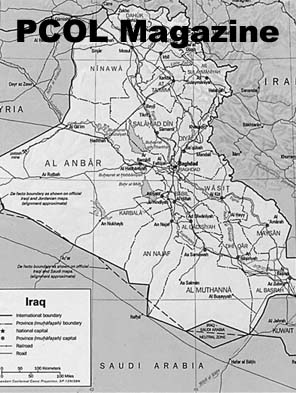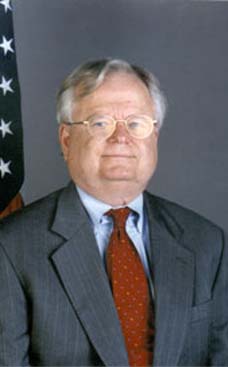
For good reason, the U.S. bipartisan Iraq Study Group considered Iraq partitioning last year in their deliberations and rejected it as a solution. As the IRS study has recommended the U.S. policy should change drastically to allow for a regional approach that links Iraq with Turkey, Syria, Iran and Palestinian concerns, policy change should also allow for an empowering approach that would integrate economic, cultural and political cooperation, regionally and internationally. The U.S. should realize that it has lost the opportunity to be the sole arbitrator or convener of peace for future Iraq. An international conference can realistically plan for this country that has been messed with for too long. Efforts to reintegrate Iraqis in their original mixed neighborhoods should be part of the overall resolution of Iraq, not the reverse. There is no softness in partitioning Iraq.
Ghassan Michel Rubeiz writes: The Joseph-O'Hanlon report is based on a misconception of the dynamics of the Iraq war. The worsening civil war is not essentially about religion; it is about community sharing of oil revenues, management of power, insuring security, and competing about land.
Partitioning of Iraq cannot be soft
12/07/2007 10:30:00 AM GMT
The U.S. should realize that it has lost the opportunity to be the sole arbitrator or convener of peace for future Iraq.
Surgically dividing Iraq after occupying it is tantamount to letting the knife do what the gun has failed to do.
By Ghassan Michel Rubeiz
NEW YORK - The partitioning of Iraq along ethnic and religious lines was proposed two years ago by Senator Joe Biden and former Assistant Secretary Leslie Gelb. The Biden-Gelb proposal was considered premature when it first appeared, but today's fragmentation of the country into domains of several militias is a sobering reality. The civil war deepens, the casualties mount and the U.S. military surge has proven so far inept.
Alternatives to current U.S. policy of continuing the war until victory are emerging. These alternatives range from an accelerated surge of troops to a diminishing of troops, from phased withdrawal to full withdrawal, from short term presence to indefinite presence and finally, from U.S. presence inside the country to presence around the country.
And now a new plan is re-emerging: soft partitioning.
A report titled "The Case for Soft partitioning of Iraq", by David Joseph, of John Hopkins School of Advanced International Studies, SAIS, and Michael O'Hanlon, of Brookings Institute, was released on July 5th.
The adjective soft partitioning is a qualifier that the three partitioned states would be coordinated by a central authority, a mini-government. This government would steer the three states, but with what force and what logistics? This central authority would be expected to administer fair distribution of revenues from Iraq's oil and to provide a federal foreign policy.
Suspense mounts. Where in history has a federal government with an army that is weaker than the armies of the states it coordinated been effective?
They explained that soft partitoning was a matter of choosing between a bad and a worse alternative. They opined that the ongoing ethnic sectarian war would continue, regardless of what the U.S. did. They insisted that diplomacy and force have failed. Withdrawing and allowing the conflict to escalate did not make sense. They concluded that helping the Shias, Sunnis and Kurds to live in peace in three separate ethnic/sectarian communities was required even if it meant relocating between two to five million people, who now live in mixed communities.
Joseph and O'Hanlon expressed regrets about the ethnic cleansing they advocated. But they reasoned that since mixed neighborhoods were emptying because of the savage war why not use social services and economic incentives to make separation less painful. The experts promoted the idea of helping people to sell their homes in insecure areas and to buy new ones in safe communities. They predicted that if jobs were offered to the displaced, the pain of displacement would be tolerable.
The two experts, with full naivety, named the three future Iraqi state-lets:“Kurdistan, Shiistan and Sunnistan. They argued that the division of Iraq into three homogeneous regions should be facilitated by U.S. troops. They admitted that the chances of success of their Iraq partitioning plan would be less than fifty-fifty”.
The report touting partitioning of Iraq is a tragic oversimplification. Dividing Iraq after a war of destruction is a continuation of a Washington policy of doing harm with an intention to do good. Surgically dividing Iraq after occupying it and eroding its stability is tantamount to letting the knife do what the gun has failed to do.
The Joseph-O'Hanlon report is based on a misconception of the dynamics of the Iraq war. The worsening civil war is not essentially about religion; it is about community sharing of oil revenues, management of power, insuring security, and competing about land.
Most importantly, the Iraqis, both Shias and Sunnis, are fighting to terminate foreign occupation.
The Kurds are the only community that desires political separation from Iraq, a nation that achieved independence in 1920. After the first Gulf war in the early nineties, the Kurds' separatist aspirations were revived by the 12 year no-fly zone imposed by U.S. air power over the skies of northern Iraq, where the majority of Kurds live.
Most Iraqis are afraid of the future; they long for a new formula of power sharing that would bring state authority back and security to all residents. All the Iraqi communities are socially and politically disoriented in a country that has lost its original national army, a major source of national unity.
Iraqis are fighting one another not because their communities are intermingled. For decades the Iraqis have enjoyed living in mixed neighborhoods. The high rate of inter marriage is not a chance factor. By regrouping Iraqis on sectarian borders, they are destined to be enemies indefinitely. The scholars who advocate soft partitioning should know that the process of learning to live with diversity is at the basis of nation building.
There is also a highly provocative religious dimension in any partition scenario. For America to act as a midwife of three ethno-sectarian failing states within Islamic borders would be an assault on Islam and on Muslim sentiments throughout the world. This is not to ignore the sectarian tension that exists among Shias and Sunnis, anywhere in the world.
Finally, since there are significant Shia and Kurdish minorities in most Middle Eastern countries, a Shiistan-Sunnistan-Kurdistan configuration would act as a template for future ethnic cleansing. This sectarian scenario would shake the foundations of the Arab region, of Turkey, and of Iran. It is in Turkey, not in Iraq, where the largest community of Kurdish minorities lives.
For good reason, the U.S. bipartisan Iraq Study Group considered Iraq partitioning last year in their deliberations and rejected it as a solution. As the IRS study has recommended the U.S. policy should change drastically to allow for a regional approach that links Iraq with Turkey, Syria, Iran and Palestinian concerns, policy change should also allow for an empowering approach that would integrate economic, cultural and political cooperation, regionally and internationally.
The U.S. should realize that it has lost the opportunity to be the sole arbitrator or convener of peace for future Iraq. An international conference can realistically plan for this country that has been messed with for too long. Efforts to reintegrate Iraqis in their original mixed neighborhoods should be part of the overall resolution of Iraq, not the reverse. There is no softness in partitioning Iraq.
-- Ghassan Michel Rubeiz is former Secretary of the Middle East of the Geneva-based World Council of Churches. His email is grubeiz@adelphia.net.



















